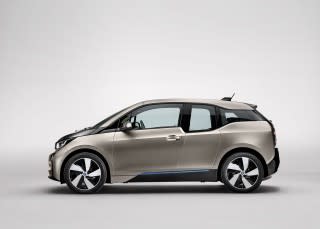Federal Tax Credits For Plug-In Hybrids, Electric Cars: What You Need To Know

If you want to get a special incentive for driving a hybrid, you're a few years too late; but a tax credit applies to nearly every electric car and plug-in hybrid on the market and it can, in some cases, effectively reduce your cost for such a model to that of an ordinary gasoline vehicle (or even less).
The widely mentioned $7,500 tax credit is arguably confusing from the start. The federal government gives information on it from a 'Tax Incentives Resource Center,' but it isn't treated as an incentive or rebate to consumers, so you don't get it at the time of purchase. It's not a tax deduction (a reduction in taxable income) either. With a tax credit, you reduce the amount of income tax you owe.
ALSO SEE: 5 Car Brands That Customers Don't Buy Twice
You claim it by making IRS Form 8936 part of your tax return. And while the form is simple and straightforward, there are a lot of other pieces of information you should be privy to.
Use it or lose it. Perhaps the biggest asterisk is that you have a tax liability for that year that meets or exceeds $7,500. If you owe less than that amount for the tax year, you lose the rest of the credit (no, it isn't an additional 'refund,' and any left over can't be applied to your personal taxes the following year).
Not all electric vehicles and plug-ins qualify. To be included on the federal list of vehicles that qualify, the vehicle must be made by a manufacturer (it can't be a conversion); it must comply with the legal definition of a motor vehicle as per the Clean Air Act, title II; and it must have a gross vehicle weight rating (GVWR) of 14,000 pounds or less.
You must buy it new, for your own use. Other requirements are that the new vehicle have its 'original use' with the taxpayer who's claiming the credit. It can't be for resale, and if it is sold, it's a used car. Furthermore, it needs to be a vehicle that's used mostly in the U.S.; and you have to claim the credit for the tax year that the vehicle is placed in service.
If you lease, you probably can't claim it. In what's perhaps the most common misconception for those just starting out cross-shopping EVs. Almost always—but not in every instance—the amount of the credit is claimed by the leasing company (who legally 'owns' the new vehicle), allowing a more attractive lease payment.
Check all of this with your tax preparer before buying. Keep in mind that different rules apply for business use, and to business owners looking to take advantage of this credit. If your purchase is at all dependent on the credit, talk to your tax preparer first. Or better yet, have an accountant who's familiar with this run your numbers and ask you any important questions. And yes, additional local and state credits or incentives might apply; your tax preparer or accountant should be able to advise on which ones apply to your situation.
To qualify, technology-wise, a vehicle must have a battery pack with a capacity of at least 4 kilowatt hours (kWh) and be capable of being recharged from external sources (not just by braking/deceleration or the engine, as in a hybrid). Provided it meets all the other qualifications, the federal government allows a credit of $2,500, plus $417 for a vehicle that has a battery with at least 5 kWh of capacity, and then an additional $417 for each additional kWh up to $7,500.
READ: And The Most-Stolen Vehicle In America Is...
![National Plug-In Day 2013: Nissan Leafs at Cupertino, CA [Photo by Corine van Deventer-Geljon]](https://s.yimg.com/ny/api/res/1.2/_3zRnaP5sE0Nklunbvw3zA--/YXBwaWQ9aGlnaGxhbmRlcjt3PTY0MDtoPTQyNA--/https://media.zenfs.com/en-us/homerun/carconnection.com/86f0003a7d6a2d30b67874f0769ce0fc)
There's one other interesting detail: The Plug-In Tax Credit isn't a limited-time offer, but it does phase out. Each vehicle manufacturer can sell up to 200,000 vehicles, and after that, the credit amount is phased out over a structured 12-month period. Even for the best-selling electric car, the Nissan Leaf—even with Nissan's plans to introduce more all-electric models—it'll be a few years before that happens.
Follow to the next page to see a list of vehicles that qualify.

Here are the electric vehicle and plug-in hybrid models from the 2013 model year and newer that, at present, the federal government lists as qualified for federal tax credits.
DON'T MISS: Study: Chevrolet Corvette Meets Owner Expectations More Than Any Other Car
Electric vehicles ($7,500 for each):
BMW i3
BYD e6
Fiat 500e
Ford Focus EV
Chevrolet Spark EV
Mitsubishi I-MiEV
Nissan Leaf
Smart Fortwo
Tesla Model S
Plug-in Hybrids:
BMW i3 REX ($7,500)
Ford C-Max Energi ($4,007)
Ford Fusion Energi ($4,007)
Cadillac ELR ($7,500)
Chevrolet Volt ($7,500)
Honda Accord Plug-In Hybrid ($3,626)
Porsche Panamera S E-Hybrid ($4,751.80)
Porsche 918 Spyder ($3,667)
Toyota Prius Plug-In Hybrid ($2,500)
___________________________________________
Follow The Car Connection on Facebook, Twitter and Google+.

 Yahoo Autos
Yahoo Autos 
